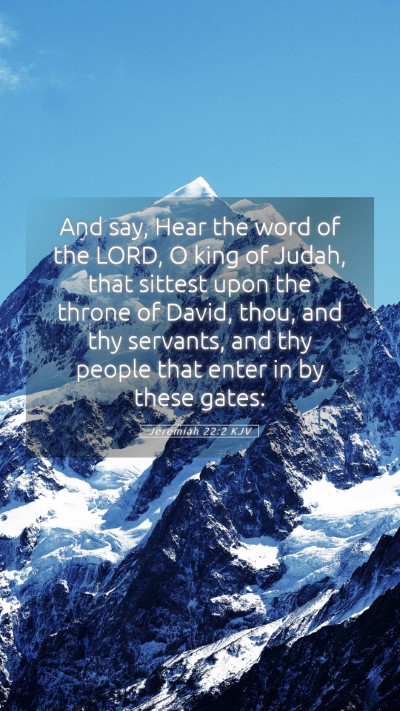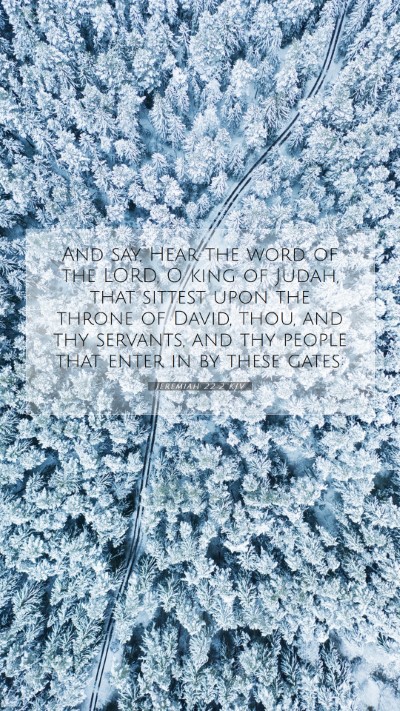Meaning and Interpretation of Jeremiah 22:2
Contextual Introduction: Jeremiah 22:2 states: “And say, Hear the word of the Lord, O king of Judah, that sittest upon the throne of David, thou, and thy servants, and thy people that enter in by these gates.” In this verse, the prophet Jeremiah is addressing the king and the people of Judah, emphasizing the importance of heeding God's word.
Summary of Insights from Public Domain Commentaries
1. Divine Authority: Jeremiah, as a prophet, speaks with divine authority, calling the king of Judah to listen intently. According to Matthew Henry, this implies a serious obligation placed upon the king and his court to recognize God's sovereignty over their governance.
2. God's Message Through His Prophets: As Albert Barnes notes, the function of the prophet is to convey God's message, suggesting that the people, including their rulers, must align their practices and policies with the dictates of the Lord. This reveals the critical role of prophets in guiding both the spiritual and social order of the community.
3. The Throne of David: Jeremiah refers to the “throne of David,” pointing to the rightful lineage and the covenant promises associated with David. Adam Clarke emphasizes that this reference highlights the seriousness of the king's duty to uphold justice and righteousness as mandated by divine standards.
Detailed Verse Analysis
The verse opens with Jeremiah commanding attention: "Hear the word of the Lord." This is a divine summons not just for the ruler but also for his advisors and the people. This collective call underscores the communal responsibility for recognizing and adhering to God's commands.
Implications of Hearing God’s Word
- Covenantal Responsibilities: The Jewish leaders are reminded of their obligations under the Mosaic Covenant, which requires them to govern justly, protect the vulnerable, and ensure obedience to God's law.
- Judgment and Hope: While this call to hear can imply impending judgment for their failures, it also carries an element of hope—should they heed the warning, there could be restoration.
Application to Contemporary Readers
This passage resonates with modern audiences as well. It calls for:
- The necessity of leadership that seeks divine guidance in decision-making.
- Individual responsibility among believers to heed God's word in their daily lives.
- A collective awareness of the impact of one's actions on the wider community.
Cross References for Further Study
- 2 Samuel 7:12-16: God’s covenant with David.
- Proverbs 21:1: The king’s heart is in the Lord's hand.
- Isaiah 1:10-17: A call for justice and righteousness.
- Jeremiah 17:24-25: The walking in God's ways as a sign of prosperity.
- Micah 6:8: What the Lord requires of you—doing justly, loving mercy, and walking humbly.
Conclusion
In summary, Jeremiah 22:2 encapsulates a crucial reminder of the need to heed divine instruction—both for rulers and for all people. It serves as a lens through which we can better understand our responsibilities before God, the significance of His word, and the importance of justice and righteousness in our leadership and daily interactions. Through various public domain commentaries, we see rich interpretations that enhance our biblical exegesis of this scripture.
As believers engage in Bible study, this understanding can enrich their discussion in Bible study groups, online Bible study, and personal study sessions. Herein lies an invitation to explore the layers of meaning contained within scripture while applying its truths to our daily lives.


